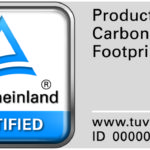THSRC: First Asian railway service granted TUV Rheinland and Taiwan Carbon Label certifications
The Taiwan High Speed Rail Corporation (THSRC) recently completed Taiwan Carbon Label and independent third-party verification, making it the first organization in Asia to achieve both certifications. With the project support of Taiwan's Environmental Protection Administration (EPA) and guidance from the Taiwan Environmental Management Association, THSRC completed the activities data inventory for all operating THSR stations and the two main depots on the island. By way of carbon footprint verification by TUV Rheinland Taiwan, THSRC has obtained "between-station passenger transport carbon footprint" certification and labeling. THSRC formally received the carbon footprint certificates from both the EPA and TUV Rheinland Taiwan on January 8.
Apart from calculus of GHG emissions per kilometer and passenger, with reference to Taiwan Carbon Label specifications, THSRC requires TUV Rheinland to verify....
passenger-transport emissions at individual stations and disclose GHG emissions for the stations on the corporate website. These actions, pioneering among Asia's high-speed rail service providers, have riveted the attention of the regional industry. At the same time, this information will be clearly marked on the back of the tickets (magnetic tickets). Through the THSRC website, passengers can also check the carbon footprint between stations to understand the amount of greenhouse-gas emissions per trip.
TUV Rheinland hopes that more service providers at home and abroad can do their part to save energy and reduce emissions. Countries around the world are expressing ongoing concern regarding the development and impact of increasingly unpredictable global climate change. To understand resource consumption and pollution emissions in daily life, governments around the world have invested labor and material resources in the collection of infrastructure data. However, the focus is often limited to the daily consumables, such as consumer electronics, beverages, instant noodles, and shampoos. This is because the scope of calculation of these consumables can be more easily defined within a single assembly or production location. For services involving a large area, such as infrastructure services such as rail transport, logistics, or telecommunications, it may be difficult for providers to conduct a full-scale carbon-footprint inventory.
TUV Rheinland hopes that domestic service providers can engage in early intervention on emissions, energy, and resource management to comply with the emissions, energy, and resource management systems requirements for business operations, saving costs and meeting future trends and customer requirements. Enterprises requiring organizational GHG emissions reporting (ISO 14064-1), product carbon-footprint communication (ISO/TS 14067), or energy and resource management evaluation (ISO 50001) are welcome to contact TUV Rheinland .



